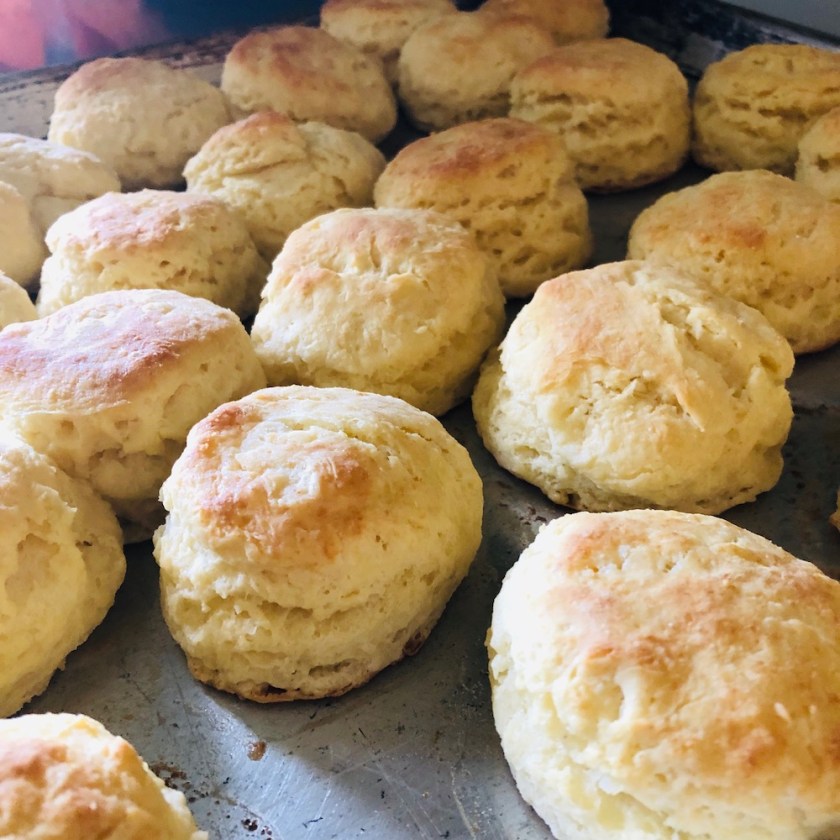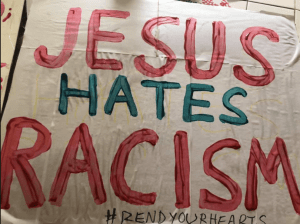Hey, who wants to talk about food? I do! Here’s what we had this week. For goodness’ sake, don’t skip over the biscuit recipe.
SATURDAY
Burgers and chips
We dig dig dig dig dig dig dig from early morn till night.
We dig dig dig dig dig dig dig up everything in sight.
We dig up diamonds by the score [not really].
A thousand rubies, sometimes more [actually not even interesting rocks].
But we don’t know what we dig ’em for [increasingly true].
We dig dig dig a-dig dig [accurate].
It seems unfair that this song should still be going through my head, but I suppose I deserve it. Damien made burgers on the grill, which is better than I deserve.
SUNDAY
Lemon honey mustard drumsticks, broccoli and dip, biscuits
You’ll be surprised to learn that we spent Sunday digging in the yard. We’re almost done, though! Really!
In the morning, we watched mass on Facebook Live, then drove to the church to receive communion. When we got home, I roasted up a bunch of drumsticks with olive oil, salt, and pepper. I made a sauce with lemon juice, honey, and mustard, and mixed up half the drumsticks with it, and left the other half plain, and put it all in the fridge. The longer the chicken sits with the sauce, the yuhmmier it gets.

I really wanted biscuits, and I do believe I’ve found the perfect recipe. It’s a little fussy, with more ingredients than seems strictly necessary, but my goodness, those were some perfect biscuits.

Light and airy on the inside with a paper-thin crisp outside, and wonderfully buttery.

I, uh, had five. They were small! (I made a quadruple recipe and got 48 smallish biscuits.)

This was a very pleasant, picnic-y kind of meal after a day of hard work.
We started moving some of the dug-up rocks to a different part of the yard, which is very disorderly and overcome with vicious blackberries, so I am very pleased. It almost looks like someone lives here now. And the hard labor is a good thing. A very good thing. Many, many times this week, I put down my phone and went out to the yard with a pair of clippers or a shovel and took care of a problem I could take care of. I don’t think I have solved racism yet, but anyway I’m sleeping better.
We’re all sleeping better. Some of us in our parents’ beds, but whatever.

MONDAY
Chicken enchiladas, pineapple
We had a bunch of smoked chicken thighs left over from . . . something. So I shredded those up and added them to chicken I shredded after pan-frying it in oil with plenty of chili powder, salt, and cumin. I basically follow Pioneer Woman’s recipe.

You know, my enchiladas are kind of gross. Not in a bad way, necessarily, but undeniably kind of gross. They’re just really flabby. Are they supposed to be flabby? I just don’t know.
TUESDAY
Hot dogs, Bugles
All I have to say about this meal is that the Bugles had a A Quiet Place: Part II tie-in, for reasons known only to Bugles. I bought them to make Lena laugh, and it worked.
WEDNESDAY
Chicken burgers, pasta salad
And what a pasta salad it was!

Dora gave me a set of fancy infused olive oils for mother’s day. They are Frankie Muniz’ special olive oils, and very good they are, Frankie Muniz’ special infused olive oils for mother’s day. She went with the basil-infused one.

She added cherry tomatoes, plenty of fresh garlic, parmesan cheese, and I guess salt and pepper, not sure what else. I advised her to use a ludicrous amount of whatever she added to the pasta, so it wouldn’t be bland, and she was listening. You could almost hear the flavor. So good. I ate so much.
Oh, Wednesday was the day we went to the BLM rally.

I was smiling in a friendly way in this picture, honest!
As a side note, Frankie and Paige Muniz say: “Learning about Ultra Premium Olive Oils is one of the best things to ever happen to us.” You might want to print that out and show it to a child who wants to be an actor when he grows up.
THURSDAY
Pork, pepper, and onion skewers; roasted chick peas, sugar snap peas
I chopped up a pork butt and set it to marinate with my spiedie marinade, including fresh wild mint the kids went out and picked. This is an excellent, easy marinade. You want to add more stuff, but everything in it packs a big punch, and it’s perfect as is.
Jump to Recipe
The plan was just to broil up the meat and serve it on rolls, but it was a little skimpy, so I decided to add some peppers and onions, and then Damien offered to grill it outside, so I put it all on skewers, which takes a long time, but on the other hand, once the idea of meat on a stick comes into my head, it’s very hard to get it out.
So.

Marinating is magic. I feel like not enough people realize this. The lemon juice breaks down the fibers in the meat and lets in all the other flavors, and it was like eating a . . . hot juicy meat cloud with charred edges. Delicious beyond all reason.
The side dish situation had become confused, so I took the opportunity to roast up some chick peas, which the kids remember fondly from back when I was counting every penny and figured out that roast chick peas were marginally cheaper than chips. I drained and rinsed eight cans of chick peas and spread them out in pans, drizzled them with olive oil (Frankie Muniz’ garlic infused olive oil) and seasoned them heavily with pepper and kosher salt. Then I baked them in a 300 oven for about two hours, stirring occasionally. They came out very crunchy, but about half still had a little chewy center.

The kids were not as thrilled as I expected to have their old friend toasted chick peas back in the game. I like chick peas so much. They are so straightforward. “Here,” they say. “I can offer you what I am, which is a pale legume, through and through. No tricks, no razzle dazzle, just some textured protein, plus a cute little skin just for fun.” They are like sitting on a couch in the afternoon, reading a book you have read so many times, you can almost recite it, and it’s kind of boring, but maybe you want to be bored, you know? They’re not too shabby with the manganese, either. 14% of RDA. Well done, chickpeas.
FRIDAY
Spaghetti
I bought a ton of canned tomatoes while under the impression that tomatoes go in enchiladas. So I guess I will make a big pot of sauce with onions and garlic and wine and olive oil.
And maybe, just maybe, we will dig.
Oh, I have some pictures of that mango coffee cake I made last week. It was good, not great.

A lot of trouble (lime zest! toasted pecan streusel!) for something that tasted like normal coffee cake; and I must regretfully admit that baking doesn’t do mangoes any favors. Now I know!
pork spiedies (can use marinade for shish kebob)
-
1
cup
veg or olive oil
-
1/4
cup
lemon juice
-
1/2
cup
red or white wine vinegar
-
4
tsp
red pepper flakes
-
2
Tbsp
sugar
-
1
cup
fresh mint, chopped
-
8-10
cloves
garlic, crushed
-
4-5
lbs
boneless pork, cubed
-
peppers, onions, mushrooms, tomatoes, cut into chunks
-
Mix together all marinade ingredients.
Mix up with cubed pork, cover, and marinate for several hours or overnight.
Best cooked over hot coals on the grill on skewers with vegetables. Can also spread in a shallow pan with veg and broil under a hot broiler.
Serve in sandwiches or with rice.






























